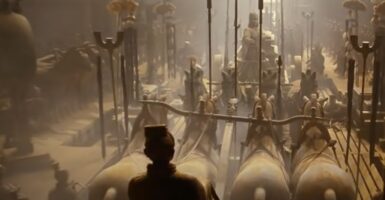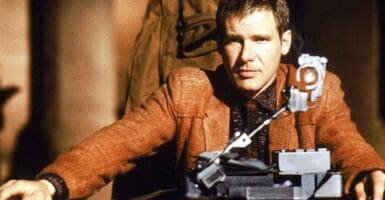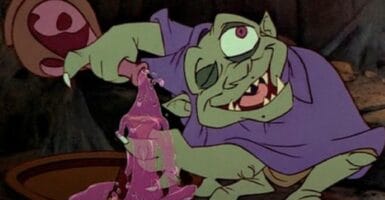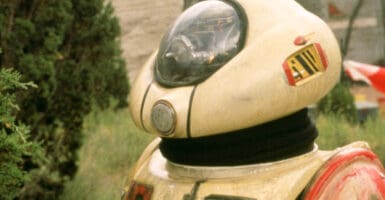Stranded Brings Bad Acting To Mars: Nick’s Giant Freakin’ Queue Review
Get your ass to Mars.
This article is more than 2 years old
With the awful-looking, Christian Slater-led space flick Stranded going straight to video next week, I was reminded of a similarly shitty indie film from 2002, also titled Stranded. Well, I didn’t actually know of its quality, as negative reviews had often kept me away. But this is my Giant Freakin’ Queue Review, dammit, and I shy away from nothing! (Except maybe Slater’s movie, if it ever comes to Netflix.)
I usually don’t like to give away spoilers in these reviews when it isn’t necessary, but in the case of Stranded, the plot is the only redeeming factor, so I feel that it would be impossible for me not to get into the juicier bits near the end. To be sure, the actors ruin this movie far more than finding out the ending will. If you’d like to know if the film is for you, though, I’ll tote out my recommendation scale early.
See Stranded if you like: watching movies with the subtitles on and the volume down; watching Vincent Gallo act smarter than everyone else around him; contemplating shitty films that are actually worth contemplating; ripping on the stupidity of Prometheus without realizing how stupid Prometheus really could have been.
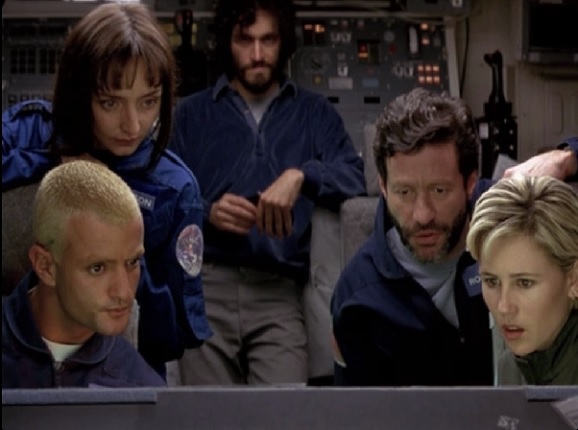
Welcome, the three of you who actually watched this flick. Stranded is directed by Spanish filmmaker María Lidón, who only made one film before and one after, and featured the only screenplay written by Spanish hard sci-fi author Juan Miguel Aguilera. There’s no sense in hanging this film’s woes on these guys, even if the dialogue runs thin at times. This is a film taken to wooden acting extremes, which comes close to making it enjoyable on both a story level and a camp level. But I really wanted to get into this plot, and it was made virtually impossible because my head could not stay orbited around anything for any stretch of time.
The year is 2020, and as the newschannel update reports in the film’s opening seconds, it’s almost 300 days since the first manned mission to Mars left Earth, The vessel is carrying a six-person international crew (who all speak English), not including Johnny Ramone as the orbiter pilot. Otherwise, we have resident champion of “Really?” performances Vincent Gallo (who hadn’t yet released The Brown Bunny) as tech engineer Luca, popular Portuguese-American actor Joaquim de Almeida (Fast Five) as astrobiologist Fidel, Portuguese actress/director Maria de Medeiros (April Captains) as the doctor Jenny, late Spanish actor José Sancho (Imperium) as the commander, director Lidón herself as lander pilot Susana, and Danel Aser as geologist Herbert. Without realizing it, I managed to rank them in order of performance enjoyability. But realize that everyone but Sancho is terrible, and he kicks the bucket early on.
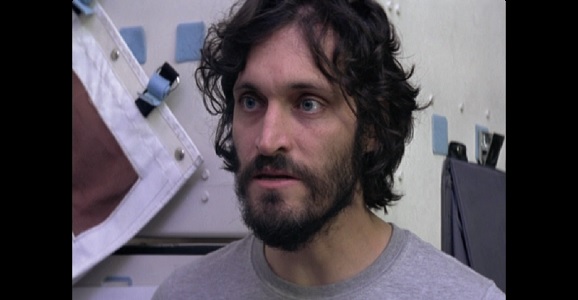
At this point in the near future, pockets of gravity are found on the surface of Mars, and the Ares crew are aiming for one of these pockets, but a technical error messes everything up and they crash on Mars’ surface. (Bye bye, Sancho.) It will take over two years for a rescue mission to come, if anyone even realized they were in danger, and they only have enough supplies for less than a year, and that’s only if they manage to get by on the barest of essentials, like light, food, and power.
This sounds like a pretty decent movie so far, doesn’t it? I mean, for a 2001 Spanish movie, this is cutting edge. But this cast and the dialogue shamelessly dull that edge. Phillie cigars aren’t this blunt. The dialogue probably didn’t read this badly on the page alone, but the actors speak the lines as if they’re being fed by a child into an earpiece, and the beats within the overall story are so bizarre at times. After waking up from the crash, which probably should have killed them all, Herbert — after conveying their status with the memorable phrase, “We’ve crashed” — tells the obviously dazed and confused Susana to get some rest, and that she would be okay. No one implicitly says this woman has a concussion, but she clearly does, and he tells her to rest. He was already thinking about getting rid of crew in order to survive. Or maybe it was just terribly misplaced advice for an astronaut to give.
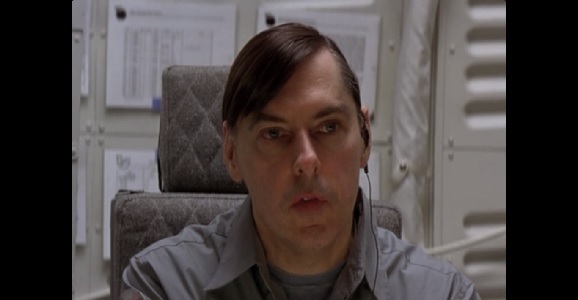
Once the commander dies, Susana somewhat reluctantly accepts the reins as commander. Fidel feels the need to take a scene telling her that she’s doing a good job for a woman, and she admits to being scared of her position. For a film directed by the character being spoken to, it’s very watered-down chauvinist. We’re forced to listen to Susana’s inane and unrealistic voiceover narration throughout the film, and in all of her simpleton, on-the-nose self-conversation, she never once brings up that guy being a fucking dick.
To bridge the pedestrian details with the second half’s rise to ambiguously enjoyable storytelling, Luca makes it apparently clear to all those involved that only two people can possibly survive until a recovery mission arrives. Luca and Jenny are the only ones worth saving, given their skills (and acting isn’t one of them). So everyone else heads out in their spacesuits, complete with excess oxygen, in order to walk off their impending death while also capturing first-hand visuals of the Red Planet in all of it’s desert glory.
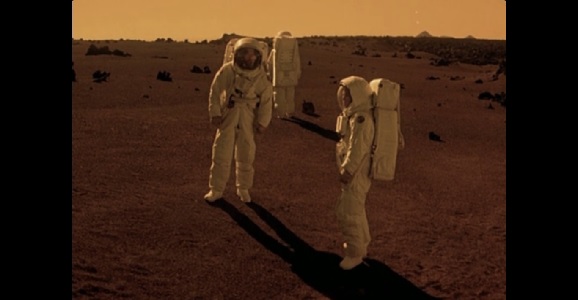
This is where I expected the film to get worse, while it actually got better, and turns into something of a Prometheus-lite discovery film, where Susana and Fidel lose communication just before entering a cave filled with wall-to-wall carvings seemingly of human origin. (At this point, Herb has died, lifting the film from the acting grave that Aser continually buried it in.) This sub-awesomeness is balanced horribly by a leak somewhere back in the shuttle, which means Luca and Jenny are almost definitely going to die, and they bicker about it, and it doesn’t create tension.
Astoundingly, Jenny then finds an actual former Marian being, all the while narrating in the way that novelists read their work aloud while writing it, and enters into a cave of light that is never explained. At this point, Luca and Jenny venture out to search for her, once her comm begins to work again, and they all meet up, and it’s revealed that oxygen is produced in this one area, perhaps meaning that all of the gravitational sectors share these environmental features. The last shot pulls out from Mars, and you see that the tunnels Jenny was wandering through were but a small portion of a gigantic hallway/shelter system carved out of the mountainous side of the crater (or whatever). I’m not kidding you, I really, really enjoyed this way-too-brief revelation. Anytime someone spoke, the magic died a little, but this was fully realized sci-fi for a few minutes. Maybe a sequel was in mind when they left the story so open-ended like that, but it was so refreshing to have a story that didn’t feel the need to explain everything that was happening. But goddamn, that’s far from exemplary of the film as a whole.
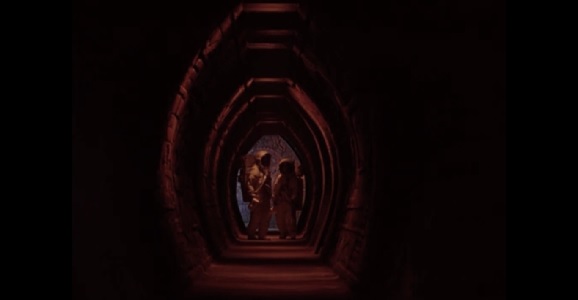
How about some of the terrible science, like taking time to give a eulogy as you bury a body outside of a shuttle you know you won’t be getting saved from for a while? Or Luca and Jenny allowing the three death-seeking crew members to take extra oxygen, as if they wouldn’t have been able to make better use out of them in times of need. Having a conversation about power conservation while all the lights are on is another genius touch.
Anyway, my recommendations above hold true, just in case you read through without having watched it before. It’s got some nice flourishes, but it stinks and pretends it doesn’t understand to know how to act as if it doesn’t stink. Thanks for reading! Check out my past Queue Reviews, which include Arctic Blast, Kaboom and Doomsday Book.
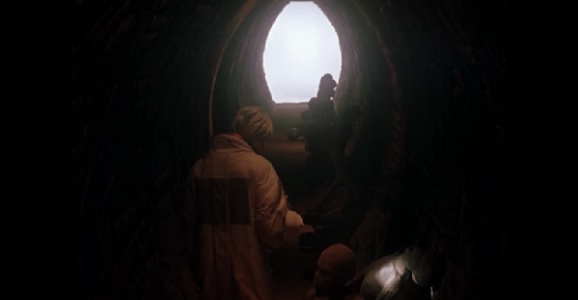
“









